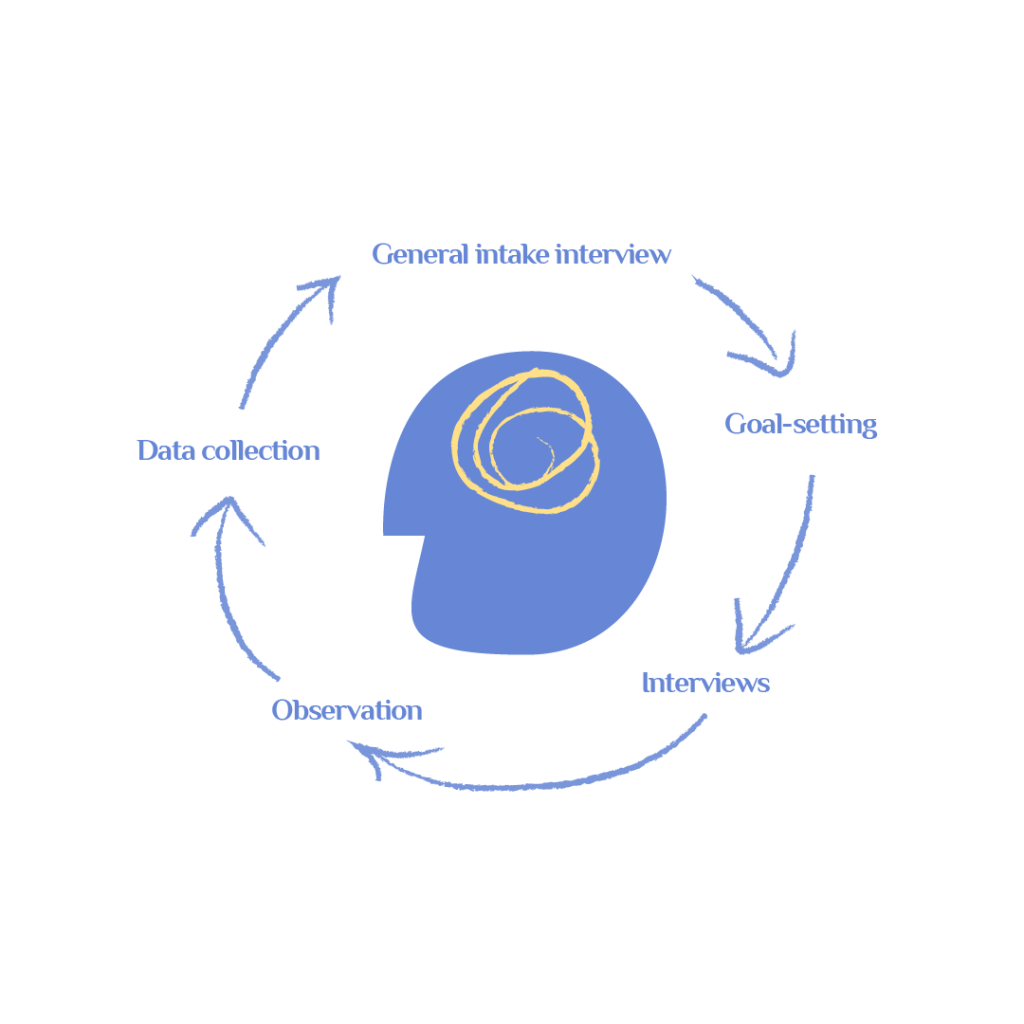You’ve attended webinars, read books and articles, listened to podcasts and tried to implement all the strategies you’ve learned, but are still struggling to see positive changes emerge with your child’s behavior. Even after trying your best, you feel like challenges during your family’s daily routines are unmanageable. You might be completely burnt out and not sure where to turn for reliable advice. You’ve identified where some of the issues lie and have ruled out mental health or medical issues with your child but recognize that some of the patterns of behavior and/or family routines feel really challenging. If any of this sounds familiar to you, getting help via a parent-coaching model might be a good fit.
A variety of professionals work as parent coaches, delivering individualized services via a parent-coaching model. This is in contrast wtih direct therapeutic work with a child; what you might imagine a psychologist of clinical counsllor doing when they do talk therapy with a child. Parent coaching is simply a model of service delivery.
Some examples of professionals that might offer parent coaching services include psychologists, clinical counsellors or behavior analysts (credential: BCBA or IBA). In this blog post we will reference ‘parent-coaches’ in general but mention a few specific that you would get if working with a behavior analyst as your parent coach.
Let’s dig into what getting help via a parent coaching model can look like and how it can help you hone your parenting skills and empower you as a caregiver. To be clear, this is in contrast with a direct treatment model, in which your child is seen directly by a therapist or professional, either with or without a parent present.
There are lots of benfits to a parent-coaching model of support when you’re looking to improve routines, reduce stress and increase wellbeing within the family.
In this article you will find info on a parent coaching model for service delivery:
- What Is Parent Coaching And How Can It Help Me?
- Best Practices for an Effective Parent Coaching Model
- How Can I Access The Services Of A Parent Coach?
What Is a Parent Coaching Model And How Can It Help Me?
Perhaps you are overwhelmed by the sheer volume of information you’ve come across regarding parenting and want to consult with a behavior specialist (e.g.,psychologist, BCBA/IBA, clinical counsellor) to find out what is truly evidence-based.
Maybe you’ve been through a parenting course and tried some strategies, but can’t help but feel you and your family need something more specialized to your child’s personality and your family values.
Alternatively, your child might have been recently diagnosed with a neurodivergent diagnosis (e.g., ODD, ADHD, anxiety, depression, autism) and you realize you’d like individualized support and coaching so you can help your child succeed.
Parent coaching from a child behavior specialist can be a powerful way for you to gain the skills you need, in order to be the interventionist with your own family, and create positive lasting changes.
Clinicians who specialize in parent-coaching will empower and support you in understanding your child’s behavior and knowing what to do to move forward. Intervention sessions are focused on working with the parent to engage in problem-solving and learning new skills rather than direct therapy with the child.
While it is true that some behavior analysts serve clients with autism in early intervention services, when they are hired as a parenting coach, the model is unique. The purpose of using a parent coaching model is to equip parents with new skills and strengthen the relationship with the child. This is in contrast with a therapist or behavior interventionist working with the child.
Research shows that a parent-coaching/training model is more effective in creating lasting changes for the child rather than when parents or caregivers are left out of the process (Harriage et al., 2016, Hogan et al. 2015, Cordisco & Strain, 1986, Hassan et al., 2018).
Parent coaching can complement other mental health or healthcare services you might be accessing. For example, your child might already be seeing a psychologist, clinical counsellor or other certified professional specializing in pediatric mental health or child development. A parent coach can collaborate with the professionals who are working directly with your child.
Related Read: How To Find A Therapist For Your Child
Are you looking for a behavioral health professional to work with?
Check out the BHC FindXpert network!
Best Practices for an Effective Parent Coaching Model
Parent coaches are likely to use a few key evidence-based practices in their parent-coaching model. If working with a behavior analyst as your coach, Behavioral Skills Training is one of these techniques that is likely to be eomployed. This is an evidence-based way to teach new skills involving the following process:
1. Explain the new skill and provide a written description.
2. Model the new skill either live or with a video model.
3. Any family members involved in the coaching sessions will have the opportunity to practice the skill. Using this format allows caregivers to practice the skills they are learning rather than passively listening about it.
4. Feedback is then given on what was done well and what can be improved the next time.
This might be followed by another learning opportunity, including another model, opportunity to practice, followed by feedback. This framework can also be used during online coaching sessions as well (Fisher et. al, 2020, Neely et. al., 2021).
There is lots of evidence to show BST is an effective model for teaching a new skill to adults, so it has become a go-to strategy for behavior analysts when they coach parents (Dogan et al. 2017, Seiverling et al., 2013, Lafaasakis & Sturmey, 2013).
That being said, each parent coach is different and their service should be tailored to meet your needs, values and learning preferences. The best parent-coaching happens when the family is receiving services that are truly tailored to their needs.
Assessment and Data Collection
Assessment is the focus at the beginning of service. The parent coach needs to know what skills the child already has, understand the family context, and what new skills and routines are needing to be developed.
This also includes gathering information about the child’s strengths and interests, but also the family and child’s goals. Behavior analysts seek to make objective clinical judgements based on data, while factoring in family context and information gathered through conversation with the family. For any parent coach, this process may include any of the following:
- General intake interview to get to know the family, caregiver or educator/classroom
- Goal-setting with the coach/behavior analyst and the caregiver (e.g., parent, educator etc.)
- Interviews specific to various topics the coach determines they need information on
- Observation of the child engaging in family routines and caregiver-child interactions while in the natural environment (i.e., home, school, community-based location)
- Data collection can then occur in a few different ways, depending on the coach:
- The family collects data and sends it to the parent coach
- The family sends a video for the parent coach to observe ansychronously
- The parent coach collects data during a liveobservation or meeting

Planning and Training: The cornerstone of a Parent-Coaching Model
A behavior analyst will use the information gathered in the assessment process to formulate a plan. This will involve how to meet the goals that have been set out in the assessment process, using evidence-based practices.
You will always be asked by a behavior analyst (BCBA/IBA) for your informed consent before starting any intervention or skills training. This is likely the case for many professionals serving as parent coaches, but something to consider and look out for. Often, the initial skills training or intervention will target a specific routine or area in the family’s life, rather than try to change everything all at once.
A parent coach may use a structured program such as Balance, which is designed to empower parents with the skills they need to prevent emerging challenging behavior in young children. Research from Dr. Hanley and Dr. Ruppel, the co-creators of this program, have found that parent coaching through early intervention was quite effective for lasting change.
Another benefit of this program is that it also can be run on the Hi Rasmus platform which has video models, instructions and data collection embedded into a user-friendly app. It’s the ideal platform to support a synchronous or asynchronous parent-coaching model for young children.
While it was studied on children with autism, it is based on principles and practices from behavior analysis, which can be applied to a variety of young children with emerging challenging behavior.
Data Collection
After learning some new skills, the caregiver begins to implement some changes in the routines that had been previously identified as goals. Your parent coach may have you collect some sort of objective information between sessions. This is certainly true if you’re coach is a beahvior anaylst (BCBA/IBA).
This may include taking some data yourself and sending it to your coach, having them observe you live through video conference practicing the skill, or sending them a video for them to assess. Decisions are made to either continue practicing a skill or move on to something else.
Monitoring
Progress towards goals is monitored by the parent coach. As goals are met, you may choose to work on a new one, taper off to less frequent meetings to check in on how goals maintain over time, or wrap up services if you think your needs have been met.
This process will look different for each family and parent coach as it depends on the contract you have laid out, and how many goals the family has.
How Can I Access The Services Of A Parent Coach?
Here are a few ways to find a parenting coach:
- Check out the BHC FindXpert network to find a parent coach or other behavioral health provider to work with
- Follow some parent coaches on social media to see which seems to align with your own values and reach out for services
- Search in Google for ‘parent coach (your area or issue you need help with) telehealth/online ‘
- Check out the ACT therapist directory on the Association for Contextual Behavior Science website for a professional that uses Acceptance and Committment Training/Therapy to work with you as a coach
Bottom Line
Not everyone will need to hire a parent coach, but it can certainly be helpful if you find that you’ve tried a lot of strategies and classes with little success. A parent coaching model can be quite effective in creating lasting and generalized positive behavior changes in family routines and increase overall wellbeing as parents are empowered through coaching.
The benefit to working with a professional using a parent-coaching model is that they can individualize strategies to your family’s specific needs and come alongside you to develop the skills you need to support your child and family for lasting change.
Research shows that an evidence based approach based on data collection, practice and feedback is effective for learning the skills you’ll need. It is common for behavior analysts to employ this framework when coaching parants.
A downside of parent coaching is that public or extended health funding for such services is limited. Also, it takes time for parents to develop and implement the skills their learn through the coach process.
For even more ways to learn, check our library of podcasts out today. Here’s one we’re sure you’ll find to be intersting: Teaching Social Skills To Neurodivergent Girls (with Gabrielle Stigant, Behaviour Analyst, Private Practice)
Related reads:
Are you looking for a behavioral health professional to work with?
Check out the BHC FindXpert network!

